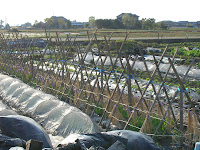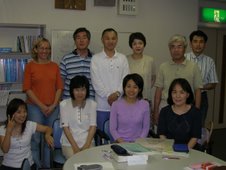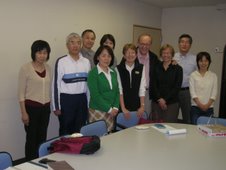Our government has a plan to teach English at elementary schools. I know that there are a lot of problems in today’s English education in Japan. Most people study English for more than six years, but most of them can not speak. They don’t need English in their daily life like they don’t need equations or functions. But on the other hand, they have a kind of feeling that if they could understand English they will get a good job and have a better life. In fact, English speaking countries lead world politics, economy, culture and other things. Yes, English is important in these fields, however, should English education at elementary school be discussed from the same view point?
Recently I often hear that people use very strange Japanese. Not only young people but also even elderly people sometimes use the wrong Japanese. One day when I was listening to the radio in my car, an announcer said midorii kaeru – green frog. I know that ao-blue or aka-red can become an adjective - aoi or akai, but midori or pink can not, so we have to say midori-no or pink-no. I often hear midorii and pinnkui, but I was very surprised that an announcer used that word. How do they get their positions? Or am I out of date? Of course I know that language as a way and means to communicate is changeable. If many people use the new words and expressions, we will accept them someday. But I think we should resist and try to keep our language as beautiful as possible. That’s why I think children have to study our own language before studying foreign languages.
Elementary school children will enjoy using English, but how many of them will keep their interest in the future? Most of them will lose their interest rapidly after they enter junior high schools. It’s only a subject to get good scores in the same as other subjects. It’s already not a language for communication for them. If they really need it or are really interested in English in the future, it’s never too late to start studying it. Necessity and interest are the biggest motivating force to acquire something.
One of my friends said that singing English songs everyday is a good way to memorize English words. Her elementary school teacher gave the students ten to fifteen minutes every morning to practice kanji. Thanks to that practice, she could keep her kanji ability for a long time. I agree that it is very good way to memorize something by repeating it. In addition the melody and the rhythm are very helpful to memorize words. It might be a good way to sing an English song every morning, and to start practicing the next song after they master one song.
I’m against English “education” at elementary school which is forced by the Ministry of Education and Science with many rules, but I think it might be a good way to keep in touch with English a little every day like her idea. Then students won’t loose the time for other subjects, and may keep their interest in English.


























 There are 4 groups of colors. The spring colors seem to be warm. The summer colors seem to be light and close to white. The autumn colors seem to be clear. The winter colors seem to be heavy. Even“pink”is different in each of the 4 groups. All of the colors around us belong to these 4 groups.
There are 4 groups of colors. The spring colors seem to be warm. The summer colors seem to be light and close to white. The autumn colors seem to be clear. The winter colors seem to be heavy. Even“pink”is different in each of the 4 groups. All of the colors around us belong to these 4 groups.

 (*Photos borrowed from an
(*Photos borrowed from an 











